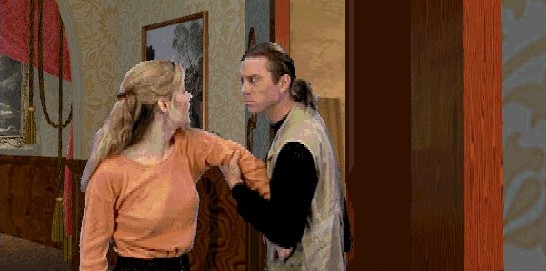Warning: Triggers
The debate over Gone Girl and whether it is misogynist or feminist largely exists because it was written by a woman. If it were written by a man, the book would probably have been written off as the work of a bitter ex still sour about having his heart stomped on. Because it was written by a woman, the book’s take on gender roles and society prompted a closer look. With the release of the cinematic adaptation, also scripted by the author, a bunch of people rushed in to declare it feminist because they enjoyed it.
This isn’t the first time this debate has raged.
In 1995, in the midst of the multi-CD point-and-click interactive movie craze, Sierra released Phantasmagoria, a 7-CD length haunted house horror game. The playable character of Phantasmagoria is Adrienne, a journalist married to Donald, a photographer. Adrienne and Donald just moved into an old spooky mansion once owned by a magician Carno, who built it for himself in order to present his own magic shows.
Carno had found a book that was full of black magic, allowing an evil spirit possessed his body that caused him to murder each of his four wives in various gruesome ways. When Adrienne stumbles upon the book – in an altar room cemented behind a fireplace – the spirit is released and possesses Donald, causing him to become an over-the-top crazy person. It’s kind of like playing a version of The Shining, if you played as Shelley Duvall who inadvertently gave Jack the first bottle of booze.
Phantasmagoria became famous due to a huge controversy surround it because of the Hard-R content within the game. The game features gruesome and graphic violence, depictions of torture, and aberrant sexuality. Somewhere in the game, Donald slugs Adrienne. In the beginning of Chapter 3, Donald rapes Adrienne, putting a grimy pallor over the game. Throughout Chapters 4 and 5, Adrienne has the potential to view all of the brutal murders that Carno inflicted on his wives (unlike the rape, these murders are actually avoidable and even missable if you don’t scour the house every day. And, in Chapter 7, Adrienne has to defeat the demon, or else she gets her head split by a giant axe, or ripped in half by a giant demon. Unless you’re using a walkthrough or are preternaturally good at these games, that means that Adrienne is gruesomely murdered time after time after time until you win the game.
The big complication is that Phantasmagoria was written and designed by Roberta Williams, co-founder of Sierra Games. Unlike most games, you get to play as a female protagonist. Albeit, a female protagonist who doesn’t run screaming from the house the moment she encounters a ball of ectoplasm that’s floating above a crib in a nursery, but a female protagonist nonetheless. This is a rarity, especially since she drives the narrative and gets to defeat the bad guy. So, there are some actual feminist elements to the game.
While the movie does have a censored/uncensored feature, the violent ways that multiple women are graphically tortured and murdered cannot be avoided as the main plot device. Not to mention that the female protagonist is repeatedly graphically murdered every time you lose in chapter 7. But, Carno dies once, non-graphically. And, Donald at least does get split in two but his death still isn’t as violent as Adrienne’s head split, not to mention the woman who is suffocated by mulch or another one who is stuffed with animal entrails.
Could Phantasmagoria be read as a feminist game where a woman has to battle the horrors of the men who hate women? A game where it puts players in the shoes of a woman who is abused and has to fight to free herself? A game where an evil spirit causes men to be bad people, practically being a demonic version of Twin Peaks‘ Bob? Sure. You could look at it that way. After all, it’s written by a woman. But, it could also be looked at as a sleazy game which uses the female author and protagonist as an excuse to sell aggressively violent torture and murder of women to a male-dominated industry.
The question this leaves me with is whether or not the gender of the author makes a marked different in how we read a certain piece of art. Do we have a need to make every woman who crafts an edgy piece of art into a feminist? Is the argument over whether or not a piece of art has an opinion about gender issues even valid?
I believe that critical and social analysis of pieces of art – whether it’s the movie or book Gone Girl or the game Phantasmagoria – plays a large and important role in our understanding of the societal constructs around us. How we interpret the works is just as important as what the authors intended to convey through their art. The discussions around these two works challenge the gendered constructs of society, and its exciting that these types of conversations are even happening at all.

